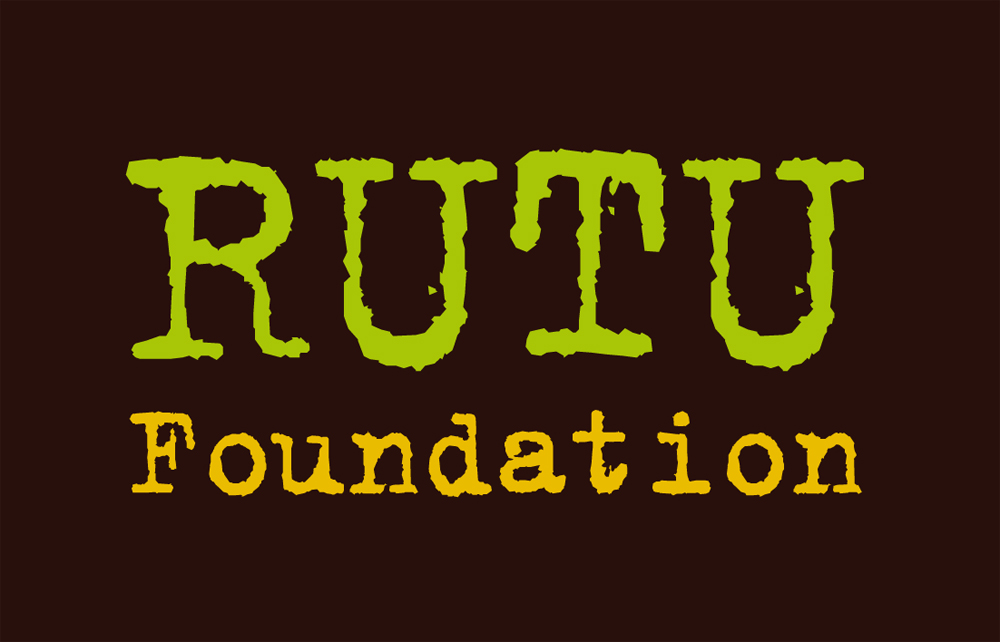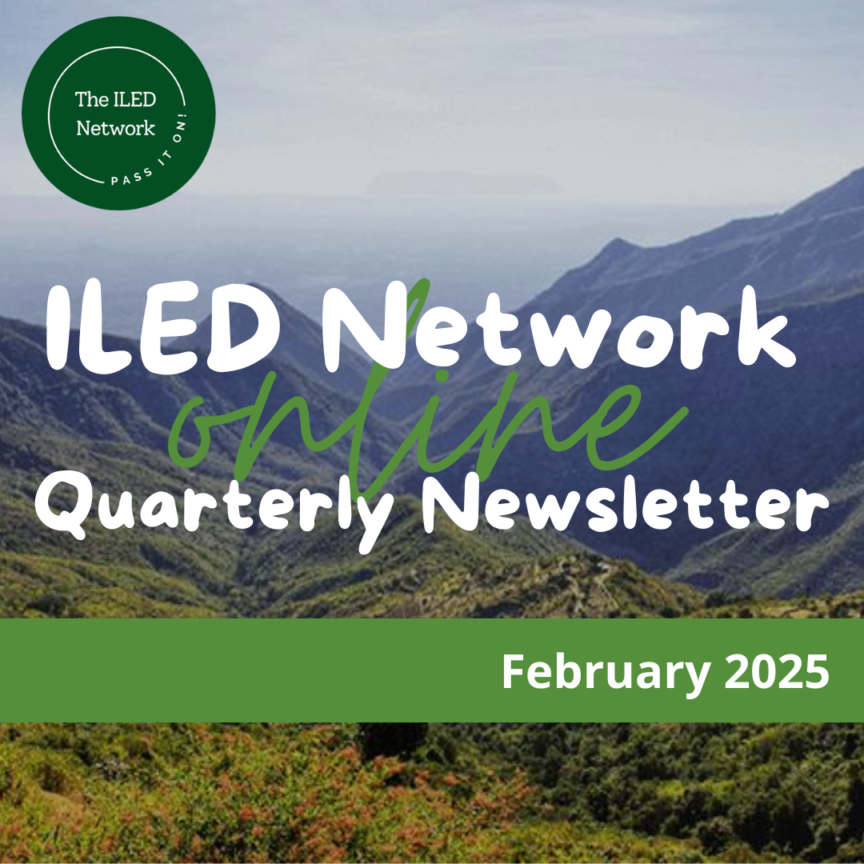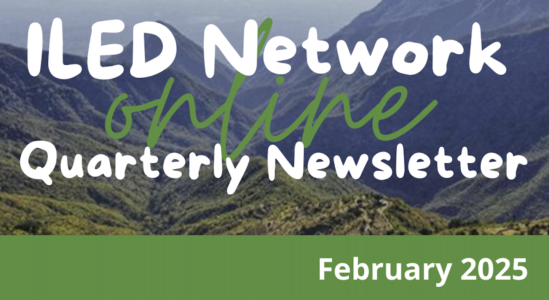Welcome to the Indigenous-Led Education (ILED) Network quarterly online newsletter! This is our way of sharing our members’ contributions to our network’s mission with ILED friends and followers. In each edition, we provide updates on our small grants program, youth fellows, exchanges, upcoming public meetings, and our latest campaigns, publications, and reports. In this edition, you will find two sections:
- Looking Back: Events from the past months
- On the Ground: Updates from members
Looking Back: Events from the past months, from November to February
New members!
During our recent online webinar on Indigenous curriculum and educational materials, we welcomed two new members to the Indigenous-Led Education (ILED) Network: Lekil Lum and Riak Bumi. They have been invited to share their inspiring stories and missions with our Network. Since its establishment in 2000, Riak Bumi has been a leading grassroots, community-based natural resource management (CBNRM) organization working in the forests of West Kalimantan, Indonesia. Lekil Lum (“Good Earth” or “Fertile Land” in Tzeltal) is dedicated to strengthening community-driven initiatives among indigenous peasant men and women in Chiapas. The organization promotes food sovereignty, protects human rights, and honors Mother Earth.
Read more about them and their work here.
Publications
Annual report 2023-2024
Last November, we shared our second Annual report spanning from September 2023 to October 2024, reflecting our progress and collective efforts. It highlights ILED’s mission, the people behind our work, and key activities like the Small Grant Fund and network events. It also showcases our Indigenous Women are Educators Awards and special projects, from gender exchanges in Asia and Latin America, and the ILED Youth Fellowship.
Read the English version here and the Spanish version here.
Network meetings
Webinar: Indigenous Curriculum and Educational Materials
On November 29, 2024, the ILED Network hosted a webinar on curriculum and educational materials, a topic that Indigenous-led organizations have repeatedly raised as essential. Most national curricula are shaped by colonial perspectives, making it critical to decolonize and recenter educational resources around Indigenous knowledge.
Four member organizations shared their experiences. SPNKK (Philippines) presented the Proud to Be Ata workbook, created to help youth reconnect with their language and culture through traditional knowledge gathered from elders. IMPECT (Thailand) shared how students and alumni developed a traditional cultural calendar, recording key activities with guidance from elders. Alianza Ceibo (Ecuador) spoke about their curriculum rooted in Indigenous cosmologies, integrating ancestral knowledge, medicinal plants, and rituals. FPCI (Panama) highlighted their science clubs, where students explore the connections between cultural traditions and scientific knowledge. This conversation is just beginning—next year, as ILED celebrates its 5th anniversary, it will release a special publication featuring case studies, interviews, photos, and videos from member organizations, continuing the work of Pass it on! Stories of Indigenous-led Education from the Grassroots.
Read more about it here.
Reviving Voices: Empowering Adivasi Communities Through Language and Culture
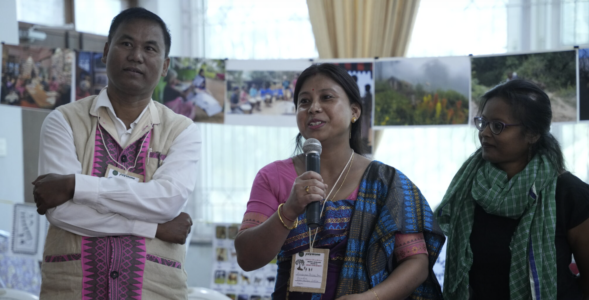
Image credits: Keystone Foundation
In mid – November 2024, the People and Nature Collectives from Keystone Foundation, an ILED Network member in India, hosted a workshop in Hyderabad on Language, Culture, and Identity: Indigenous-Led Education Initiatives. This gathering launched a nationwide network focused on education, intergenerational knowledge transfer, and inclusive spaces for Indigenous-Adivasi communities. Seventy-five participants from across India—professors, filmmakers, teachers, and activists—shared strategies for preserving oral-based languages. Discussions highlighted the role of language in safeguarding Traditional Ecological Knowledge and Traditional Cultural Expressions, stressing the urgency of revitalization efforts as linguistic shifts threaten cultural ties.
Read more about it on our website or in the Keystone Foundation page.
In-person meetings in Kenya and Uganda: women and plants
The In-Kenya and Kenya-Uganda exchanges, held under the ILED Gender Program, brought Indigenous women together to share and learn from each other’s knowledge and practices. The In-Kenya exchange, held in Trans-Nzoia County, focused on the preservation of indigenous knowledge around food, medicine, and cultural values. Ogiek and Sengwer women discussed topics like traditional seed conservation, beekeeping, and the impact of climate change on indigenous crops. They also explored how traditional medicine and cultural practices can contribute to modern sustainability efforts.
In February, the group of Sengwer and Ogiek women traveled to Uganda to meet with ILED partner organisation FED. The exchange aimed to explore how Ugandan communities preserve their indigenous knowledge, particularly in traditional medicine. They visited Kibasi, a community focused on medicinal plants, and Tooro Botanical Garden, where they learned about reforestation, medicinal tree species, and sustainable beekeeping. What stood out in both exchanges was the high involvement of youth in learning and preserving traditional knowledge.
The exchanges have sparked new ideas and next steps, including a potential visit from the Ugandan women to Kenya and seed funding for women-led ILED projects in the Ogiek communities. These initiatives aim to strengthen the role of Indigenous women as knowledge bearers and educators, ensuring the sustainability and transmission of their cultural heritage.
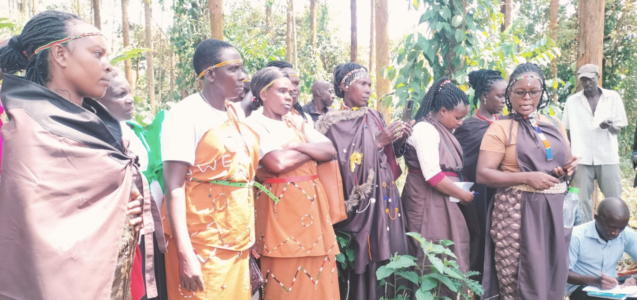
Image credits from ILED exchange in Uganda: FED, OPDP and Sengwer CBO
Campaigns
Give a forest story campaign
To mark the 25th anniversary of Mother Language Day we have partnered with the Rutu Foundation and the Language Friendly School, to invite you (teacher, student, parent, child, teenager, sibling, everyone!) to participate in a month-long campaign titled “Give a forest story” The campaign will run from February 21st, International Mother Language Day, to March 21st, a date that unites both the International Day of Forests and the date of Elimination of Racial Discrimination.

Our goal is to collect 100 stories about forests from around the world for children in as many languages as possible, all accompanied by translations to ensure they reach children globally. This initiative encourages both children and adults to exercise their creativity, explore their connection to forests, understand different cultural perspectives on nature, and share their stories with others while also enjoying tales from peers across the globe. With this campaign, we want to raise awareness about the well-being of children and young people, especially students who speak a language other than the school language. The climate crisis, social media addiction, and discrimination based on language, dialect, or accent—our children are growing up in challenging times.
If you are interested in participating, read the full call to action here (in English), or in Spanish or Dutch.
On the Ground: Updates from members
Videos from our Bribri youth fellows in Costa Rica
The in-person exchanges that took place in East Africa made it to Ugandan news!
Thank you for being part of our journey! Ready to make an impact? Here’s how you can get involved:
- Follow us on our social media @ILEDNetwork to keep up with our updates.
- Email us at iledsecretariat@rutufoundation.org if you are interested in donating or collaborating with our network.
- Complete this Google Form if you would like to join our network.
Stay tuned for next month’s issue, where we’ll dive into our webinar on Indigenous curricula and share our annual report.
Warm regards,
The ILED Network Members.
